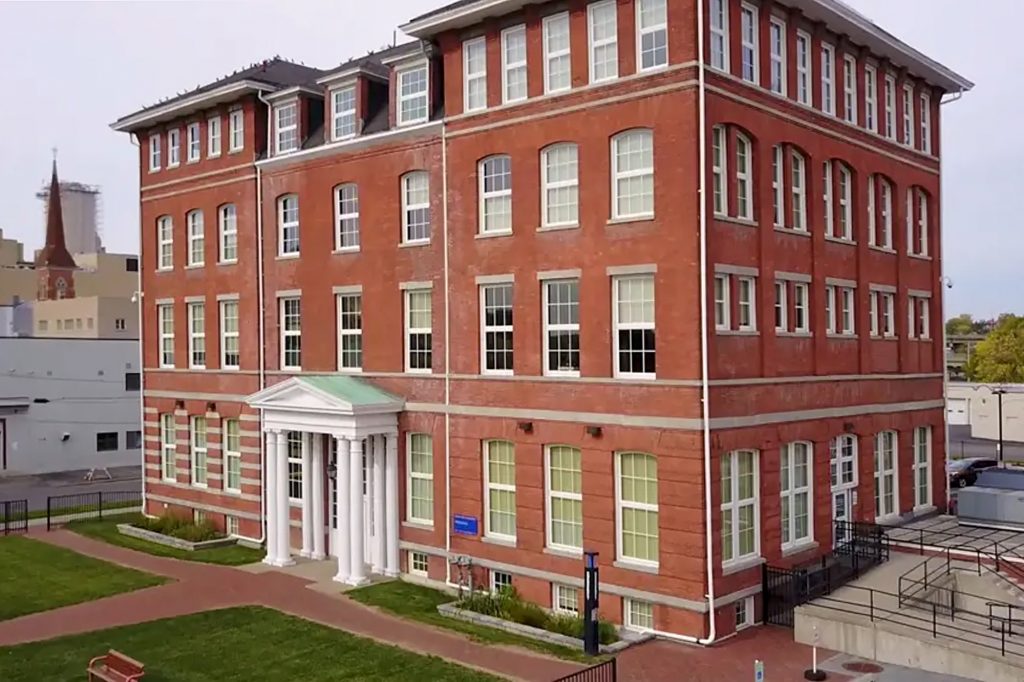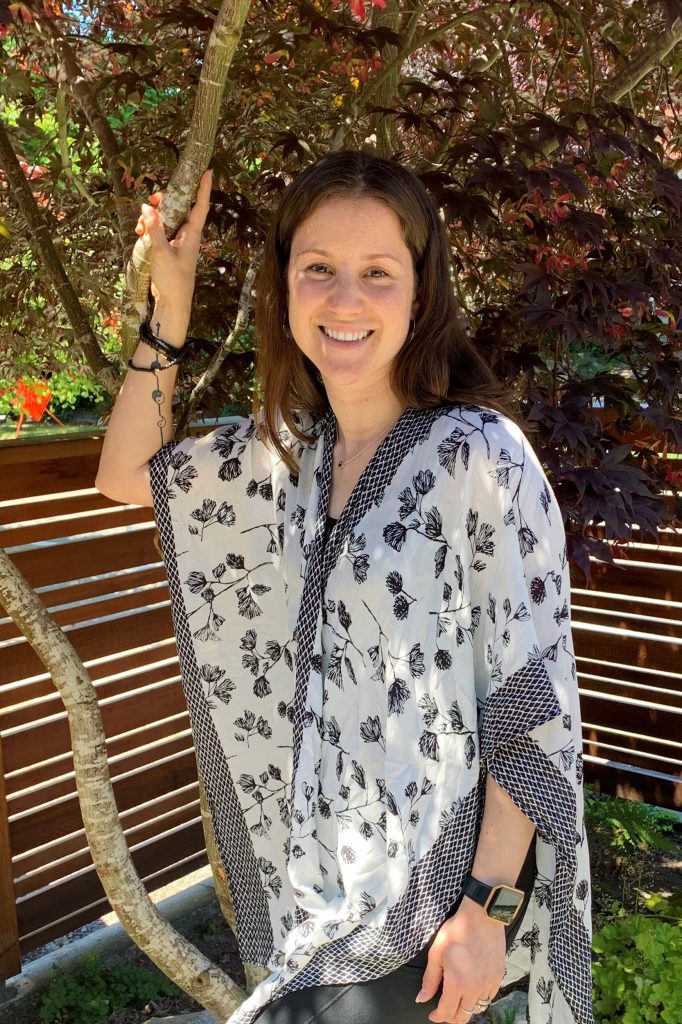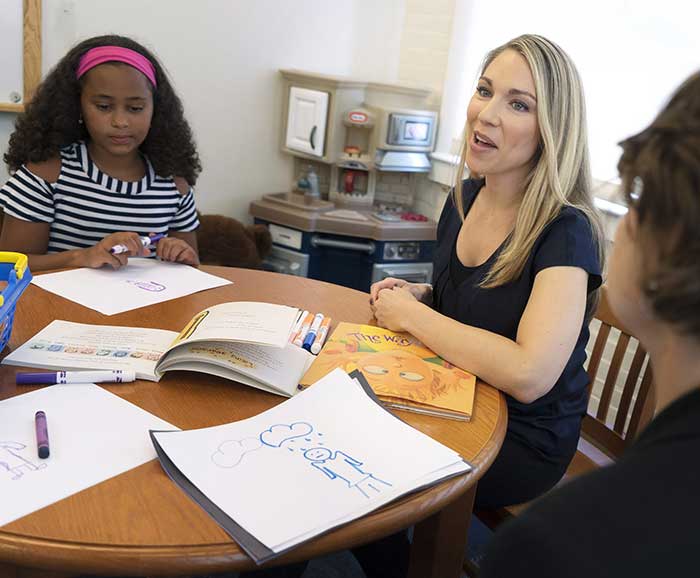Linda Stone Fish makes sure her space is clean and quiet as she places a virtual call in her small, downtown Syracuse office. Tucked away on the fourth floor of Peck Hall, the Syracuse University professor supervises doctoral students who provide free mental health services to area residents. Many of the clients, she says, are victims of poverty, violence and systemic racism.
A couple and family therapist specializing in LGBTQ issues, Stone Fish is among tens of thousands of mental health professionals in the United States adjusting to life during COVID-19, as the demand for their services climbs.
“Teletherapy is here to stay,” says the Falk Family Endowed Professor, against the hum of traffic from nearby Interstate 81. “The pandemic has forced us to integrate it into our teaching, research and practice. The opportunities outweigh the challenges.”
Stone Fish serves on the faculty of Marriage and Family Therapy (MFT), a signature department at Falk College. Home to a half-dozen graduate programs, including the nation’s first accredited MFT master’s program, the department is a leader in supervised clinical training—be it in person, virtual or both.
“Most programs focus on the individual. We, in turn, consider the psychosocial and cultural contexts of issues that come up in research and clinical practice,” says Stone Fish, who divides time between the classroom and the department’s Couple and Family Therapy Center (CFTC) in Peck Hall. “Telehealth enables us to address diversity and inclusion in new, transformative ways.”
Credit the pandemic for turning teletherapy from a nice-to-have into a must-have. In MFT, where hands-on, experiential learning permeates the curricula, technology is improving the speed and efficacy of treatment. As a result, growing numbers of millennials (ages 26-40) tend to prefer a video camera over a therapist’s stereotypical couch.
Thom deLara G’75, professor of practice and chair of MFT, is not surprised by the trend. “Telemedicine has been around for about 40 years, but only in the past five or six has it become integral to the mental health industry. COVID-19 accelerated the process,” he says.
Adds Stone Fish: “The transition was bound to happen. Luckily, the University had the people, programs and infrastructure in place to pivot to a virtual setting.”

Expanding Its Urban Footprint
Jesse Truesdell Peck was a Methodist pastor who cofounded Syracuse University and served as the inaugural chair of the Board of Trustees. In 1896, he built what became known as Peck Hall on the site of a demolished carriage factory. Housing the University’s new College of Medicine, the opulent brick structure boasted, among other things, the nation’s first physiological laboratory for students.
Time was not always kind to the four-story walk-up. A series of postwar events, including SUNY’s acquisition of the College of Medicine, turned Peck Hall into an afterthought. It didn’t help that the University’s Main Campus was a half-mile away and later separated by an elevated stretch of Interstate 81.
Straddling East Genesee and McBride streets, Peck Hall eventually fell into disrepair. Tenants such as University College and the Central New York Charter School came and went before urban decay shut down the building for good in 2005.
Salvation came from an unlikely corner: MFT, a small, bustling department that wanted to consolidate its programs under one roof and expand its urban footprint. Falk’s dean, Diane Lyden Murphy ’67, G’76, G’78, G’83, teamed up with attorneys William Gilberti L’78 and Joshua Heintz L’69, both of whom purchased Peck Hall and nearby Reid Hall in 2007. Five years and $2 million later, Peck reopened as MFT’s new home. Reid Hall was retrofitted to contain the McMahon Ryan Child Advocacy Center, dedicated to ending child abuse.
Murphy notes the convenience and accessibility of MFT, touting its location in the “heart of the city” and proximity to McMahon Ryan. “Besides providing critical mental health services for individuals, couples and families, Peck Hall meets the needs of our students while supporting the research and scholarship of our faculty. Because of our location, this good work continues and benefits everyone tremendously,” she says.
According to deLara, MFT’s nearness to some of the nation’s most impoverished neighborhoods, combined with Falk’s new technologies, facilities and equipment, enables therapists to take a “progressive, collaborative and creative approach” to training and learning.
“With the shortage of mental health services, the need for properly trained clinicians is extraordinary,” says deLara, who has more than 40 years’ experience as a mental health practitioner and management consultant. “We work with children and adults who are dealing with trauma, abuse, depression and a host of other issues. There’s nothing we haven’t seen.”
That half of Americans with diagnosable mental disorders don’t have access to care is abhorrent, he adds. “We look at the world around us and figure out how to meet the needs of our students and clients.”
MFT’s launch in 1969 coincided with the emergence of behavioral couples’ therapy and behavioral family therapy. Although MFT was a one-of-a-kind program, its students initially were more interested in honing their pastoral counseling skills—a nod to one of the department’s founders—than becoming therapists.
Since then, the department has evolved into a crucible of innovation and entrepreneurship. It is home to the first and only accredited Ph.D. program in MFT in New York state and the only dual degree program in MFT and master of social work in the country. In August, MFT will offer a new online master’s degree program.
“Employment of marriage and family therapists is expected to grow more than 20 percent over the next decade,” deLara says. “These therapists will work in a variety of settings, including private practice and mental health centers. Using technology to link classrooms, counseling areas and faculty offices, we can seamlessly train the future workforce.”
He attributes the field’s popularity to several factors, including a lack of demonstrated effectiveness of traditional approaches to mental health issues, the reduced stigma associated with seeking treatment and the need for new approaches to mental health issues in context of where they exist—for instance, with one’s family, relationship, marriage, school or community.
“You also need a license to practice in any of the 50 states. Kind of legitimizes the profession, don’t you think?” deLara smiles.
Meeting the Critical Need for Services
The crown jewel of the department is CFTC, which has existed in different permutations since the early 1970s. Offering no-cost, confidential therapy services to families, couples and individuals affords the center a kind of hidden-gem status.
“We see 200-300 clients a year—the equivalent of about 7,000 visits,” says director Tracey Reichert Schimpff, who also oversees MFT’s clinical services. “Many of our therapists are graduate students, supervised by licensed faculty members. Since their work is contextual, students learn how to navigate client systems and relationships.”
CFTC’s clientele, half of whom are from low-income neighborhoods, reflect the area’s socioeconomic diversity. A majority of clients, in fact, report growing up with a high number of adverse experiences. They inevitably present with a host of problems, such as relationship difficulties, communication struggles, family violence and substance abuse.
Hence, MFT takes what Professor of Practice Dyane Watson calls a “trauma-informed, socially just, Self-in-Systems” approach. “We integrate self-understanding of students in clinical training with a systems framework for clinical work with clients,” she explains. “This approach rests on the belief that therapists’ life experiences, value systems and social locations influence what they pay attention to, the decisions they make and the way they react to families they work with. Students then become aware of themselves and the impact they have on their contexts.”
Watson boasts of CFTC’s Gender Expansive Support Team (GEST), co-led by Associate Professor Deb Coolhart G’01, G’06 and Clinical Supervisor Daran Shipman G’10. In addition to their usual caseload, GEST therapists help individuals, couples and families become more attuned to one another as they grapple with gender exploration or transition.
“I had such a diverse population of clients and classmates,” remembers Theresa Jenkins ’00, G’17, a former GEST therapist who now works for Harvest House Counseling in Syracuse. “The experience gave me the theoretical skills and knowledge I needed to become an effective therapist. It taught me the importance of being my authentic self.”
There’s also Reichert Schimpff’s Adolescent Diversion Program (ADP), a collaboration of CFTC; the City of Syracuse Adolescent Diversion Court; and the Center for Court Innovation, a nationwide nonprofit involved with criminal justice reform. Most ADP clients are 16- and 17-year-olds indicted for one or more violations or misdemeanors. “We provide services and interventions that improve their self-worth and family communication skills. It is work that’s been proven to reduce recidivism,” she adds.
Experiential Learning and Career Success
Longstanding partnerships, such as those with Liberty Resources, Vera House, The Salvation Army and Catholic Charities, underscore MFT’s mission. They also help students find jobs.

Carrie Land-Steves G’09 is one such beneficiary. Interested in trauma-informed clinical therapy, she parlayed an internship at Vera House, a local leader in domestic and sexual violence services, into a full-time gig. Today, she is the agency’s clinical program supervisor—a position she considers a “perfect fit.”
“The experiential training I got at Syracuse University became the foundation for my clinical practice,” says Land-Steves, who, like all MFT students, underwent 500 supervised clinical hours of direct client contact. “This meant being in a room with clients and getting feedback from professors in real time. Afterward, I studied videos of my sessions and reflected on how the space was shared, in terms of body language and intervention.”
Land-Steves credits MFT faculty and staff for fostering a supportive learning environment. She harbors special affection for former CFTC director Anne Gosling. “She had a very loving presence. There was no BS with her. Anne wanted us to be the best therapists and people we could be,” Land-Steves says.
Jenkins also thrived in MFT’s personable, professional setting. When asked to cite a professor who influenced her, she answers, “All of them.” “Every single faculty member took me under their wing, at one time or another,” says Jenkins, who earned certificates of advanced study in addiction studies and trauma-informed practice. “Whenever I see them, my heart melts. I was—and still am—honored to be part of this fine group of individuals.”
Understanding Lived Experiences, Serving Marginalized Communities
Some of MFT’s most salient work takes place not in an office or a classroom but on the city streets. “Some people seek help because they think their marriage or relationship is in danger. Our work is much more contextual than that,” Stone Fish says.
Committed to serving marginalized communities, Associate Professor Rashmi Gangamma oversees MFT’s refugee mental health program. She and her doctoral students collaborate with local communities to increase access to therapy services. This has included the development of a training module for spoken-language interpreters and therapy students to provide culturally responsive psychotherapy. “I have found there is a lot of strength in building collaborative efforts, rather than each person doing their own thing,” she says.
With more than 10,000 refugees resettled in Onondaga County in the past decade, mental health access is a concern to MFT faculty. Thus, the department has partnered with PEACE Inc.’s Head Start program to provide free family therapy services to low-income refugee families with young children.
“Different cultures have different ideas about treatment,” says Reichert Schimpff, noting the long-term effects of displacement on mental health. “Rashmi has spent more than five years developing relationships with our refugee neighbors. Her research is actually therapeutic.”
Cultural competence also pervades MFT’s partnership with the Street Addiction Institute Inc. (SAII). Established by Timothy “Noble” Jennings-Bey, SAII address the causes and consequences of neighborhood violence. The nonprofit offers year-round programs for at-risk youth, many of whom are victims of unaddressed trauma.
SAII grew out of project involving Jennings-Bey, founder of the locally based Trauma Response Team; Sandra Lane and Dessa Bergen-Cico ’86, G’88, G’92, professors in Falk College; and Robert A. Rubenstein, Distinguished Professor of Anthropology in the Maxwell School of Citizenship and Public Affairs. Collectively, they have authored more than a dozen articles about the social determinants of mental health.
“Noble connected street life to addiction, in an attempt to explain why young men engage in destructive criminal behavior,” says Lane, a Meredith Professor of Public Health and Anthropology. “For our clients, receiving treatment in a location that is convenient and familiar can inspire others to get help.”
Lane has developed an MFT course module that examines how various determinants, such as crime and trauma, affect the mental health of a community. For students drawing connections between systemic racism, police violence and COVID-19 health disparities, the module is timely and relevant.

“It’s important for MFT therapists to understand the lived experiences of their clients,” Lane says. “Systemic racism, for instance, is more than a slur. It involves decisions made by people who may not even think they’re racist. The mental impact of these decisions, which affects our homes, schools, offices and courts, is only beginning to be understood.”
It’s this trauma-informed, socially just approach that sets MFT apart from other clinical training programs, according to Stone Fish. She illustrates her point by referencing an intervention created by one of her doctoral students, who runs Zoom meetings for local victims of police brutality.
“Since the pandemic hit, the University has been doing everything it can to make our community feel safe and secure,” Stone Fish says. “There’s no secret to feeling better, but with teletherapy, we provide greater access and privacy than ever before. For our own students and their clients, it may be their best option.”
~ Rob Enslin
A Syracuse University Story first published on July 21, 2020.
